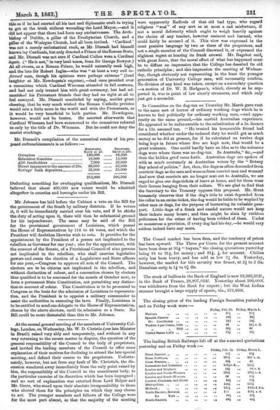Mr. Johnson has laid before the Cabinet a veto on
the Bill for the government of the South by military districts. If he vetoes it, it will be immediately carried over his veto, and if he shirks the duty of acting upon it, there will then be substantial ground for his impeachment. The same may be said of the Bill for the provisional government of Louisiana, which passed the House of Representatives by 118 to 48 votes, and which the President will doubtless likewise wish to veto. It provides for the appointment by the President of a person not implicated in the rebellion as Governor for one year ; also for the appointment, with the consent of the Senate, of a Provisional Council of nine persons not implicated in the rebellion, who shall exercise legislative powers and cause the election of a Legislature and State officers for one year,—Congress to approve all acts of the Couucil. The electors are to be citizens not implicated in the rebellion, and without distinction of colour, and a convention chosen by electors thus qualified is to be convened for the month of October next, to form a permanent State Constitution, not permitting any distinc- tion on account of colour. This Constitution is to be presented to Congress as the basis for the admission of Louisiana to representa- tion, and the President is to appoint a military commander to assist the authorities in executing the laws. Finally, Louisiana is to be entitled to send one delegate to the House of Representatives, -chosen by the above electors, until its admission as a State. No Bill could be more distasteful than this to Mr. Johnson.






























 Previous page
Previous page